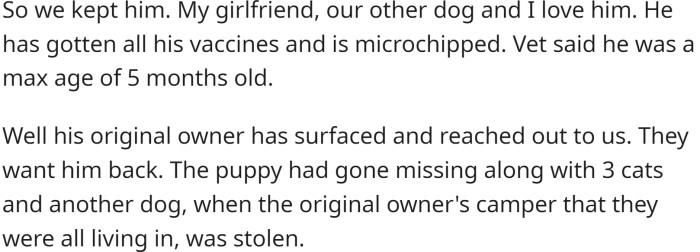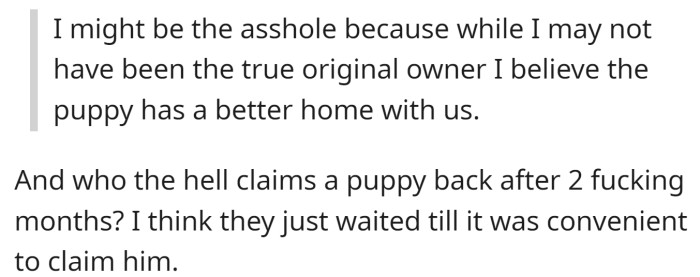Redditor Refuses to Give Back a Stray Puppy to a Person Claiming to Be Its Owner but Has No Proof
Taking in a stray dog can be an emotional and rewarding experience, but it can also be challenging when the dog's original owner surfaces sometime later. While you may have formed a bond with the dog and provided them with love, care, and a home, the owner may also have an emotional attachment to their pet and want them back.
This can create a tricky situation that requires delicate handling. But what should you do if several months pass?
OP and his girlfriend found a puppy on their front lawn over two months ago. Despite their efforts to find the puppy's original owner, they were unsuccessful and decided to keep him.
However, the original owner has now surfaced and is demanding the puppy back, claiming that he was stolen along with three cats and another dog from their stolen camper. The main character refuses to return the puppy, while his girlfriend feels guilty and thinks they should give him back.
The original owner has been facing legal troubles, and there is no police report of the theft. The main character and his girlfriend have been building their case and have found a lawyer in case the situation goes to small claims court.
They are concerned that the original owner may try to take the puppy by force if they find out where they live. Read the full story below:
OP asks:

OP and his girlfriend found a puppy on their front lawn over two months ago.

Despite their efforts to find the puppy's original owner, they were unsuccessful and decided to keep him.

Ethics of Pet Ownership and Responsibility
Dr. Sophie Reynolds, an animal behaviorist, emphasizes the ethical responsibilities that come with pet ownership.
Research indicates that pets are often viewed as family members, and their well-being should be prioritized above all.
This creates a moral imperative for owners to ensure that their pets are cared for and treated with respect, especially when ownership is contested.
However, the original owner has now surfaced and is demanding the puppy back.

OP posted a lengthy update:

The man is claiming that he was stolen along with three cats and another dog from their stolen camper.

According to studies published in the Journal of Animal Ethics, disputes over pet ownership often arise from misunderstandings about commitment and responsibility.
When individuals fail to communicate their intentions clearly, it can lead to conflict and emotional distress for all parties involved.
Understanding these dynamics can help mitigate disputes and promote responsible pet ownership.
The original owner has been facing legal troubles, and there is no police report of the theft.

The puppy stayed with them.

The man contacted them 65 days later.

The Emotional Impact of Pet Loss
The emotional impact of losing a pet can be profound, as noted by Dr. Carol White, a grief counselor.
Her research highlights that individuals often experience similar grief reactions as they would after losing a human loved one.
This underscores the importance of recognizing the emotional weight of pet ownership and the grief that accompanies loss.
And...

They refused to meet in person.

They are concerned that the original owner may try to take the puppy by force if they find out where they live.

To navigate disputes over pet ownership, experts recommend open communication and legal guidance when necessary.
Establishing clear agreements about pet care and responsibilities can help prevent conflicts from arising.
Additionally, fostering a compassionate dialogue can create an environment where all parties feel heard and respected, reducing emotional distress.
OP has offered the following explanation for why they think they might be the a-hole:

There is a good chance that the person is lying and just saw an opportunity to get a free animal.

This Redditor says:

If they were really concerned, they would’ve done something about it...


OP and his girlfriend should stand their ground.

The whole story does sound suspicious.

They should not give him money.

The bottom line is:

In such a situation, the first step is to verify that the person claiming the dog is, in fact, the original owner. You can ask for proof of ownership, such as veterinary records, adoption papers, or a photo of the dog with the owner.
If there is no proof, it's important to be cautious and not give the dog away until you are certain that the person is the rightful owner. If you are certain that the person is the original owner, you can try to negotiate with them. You can explain how attached you have become to the dog.
Psychological Analysis
This situation illustrates the complexities of pet ownership and the emotional weight of disputes regarding animals.
Recognizing the responsibilities that come with pet ownership can help guide individuals in resolving conflicts more empathetically.
Analysis generated by AI
Analysis & Alternative Approaches
The ethical responsibilities of pet ownership highlight the emotional complexities involved in disputes over animals.
By emphasizing open communication and responsible ownership, individuals can navigate these challenges more effectively.
Ultimately, fostering understanding and compassion can lead to healthier relationships surrounding pet ownership.



